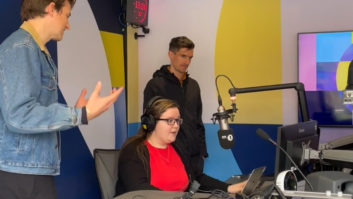
‘If they impose an additional royalty, then broadcasters should also be free to charge for promoting artists and their recordings; like any other product.’ Amador S. Bustos
President/CEO
Bustos Media LLC
Q: What’s the biggest challenge facing you as a radio manager in 2009?
The severe decline in national sales and the larger regional retail accounts.
Q: How will your business overcome the economic climate in general and the tough time for radio revenue specifically?
Increasing attention and service to the local direct clients who are trying to survive as much as we are.
Q: What business initiatives has your organization explored in your efforts to grow?
We launched a company-wide campaign called “United for Prosperity,” where we designed a high-frequency advertising schedule to run Sunday through Wednesday.
Q: What is your assessment of digital radio at this juncture?
We have not implemented HD Radio due to cost of installation and the lack of receivers in our audience segment. The Hispanic market is usually a later-adopter, compounded by the fact that it is not being addressed directly on this technical radio innovation.
Q: Does radio need to embrace online and mobile platforms further? How much does the future of the industry lie in these applications?
I think radio does need to embrace these platforms but they will only be complements to radio advertising; not its savior.
Q: How will the change in the presidential administration affect you, and the industry?
I see no significant benefit, despite its advocacy of greater minority participation in broadcasting, but I do not see any harmful effects either.
Q: Should lawmakers allow the adoption of royalties to artists, what NAB is calling a “performance tax”?
Absolutely not! But if the legislators are so inclined, then they need to open up the market at both ends. If they impose an additional royalty, then broadcasters should also be free to charge for promoting artists and their recordings; like any other product.

‘Use the listener loyalty programs, the texting, Internet and other platforms to generate revenue for both the stations and the clients.’ Mary Beth Garber
President
Southern California Broadcasters Association
Q: What’s the biggest challenge facing you as a manager in 2009?
Getting my people to maintain confidence in themselves and radio’s ability to sell for clients.
Q: How will your business overcome the economic climate and the tough time for radio revenue?
Perhaps we should ask for earmarks for all our retail advertisers.
Seriously, we are encouraging the managers and sales people to embrace, and help their clients embrace, the multiple facets of their radio brands. Use the listener loyalty programs, the texting, Internet and other platforms to generate revenue for both the stations and the clients. To combine advertisers together who have common targets and tangential marketing goals. And provide the sellers with material to demonstrate that advertising, especially on radio, helps build businesses now, throughout a recession and into dominance and prosperity at the other end of this cycle.
The thing to remember most about the “state of the radio industry” is that there is no other medium like radio. It is the only mass medium left that delivers virtually all of its reach in real time with live listening. As long as 235 million people need us and use us every week, radio will be a viable, valuable part of the communications industry. Now if we could just fix the advertising and retail industries …
Q: What business initiatives has your organization explored?
We are working on programs in conjunction with Arbitron, the local Advertising Club (thinkLA), and the Media & Marketing Research Council of LA to expose advertisers and agencies to ways to use the new media side of radio, and new ways to make the “old” radio work like new.
We’ve developed working relationships with several outside companies — BIGresearch, Genergraphics and others — to develop different material to demonstrate the superior strengths of radio in influencing purchasing decisions.
Q: Should lawmakers allow the adoption of royalties to artists, what NAB is calling a “performance tax”?
No.
Q: Does radio need to embrace online and mobile platforms further?
The Internet and wireless are the future of this business. And they should be a much greater part of the “now” of this business.
Q: What would you like to see from the FCC that you haven’t in the past?
More people like Bobby Baker, who understand business, fairness and common sense. [Baker is assistant chief of the Policy Division of the Media Bureau.]
Q: Who is the radio business person you admire most? Why?
Jerry Lee. He personifies passion about radio.

Locality is the essence to successful radio. We are producing local products while the giant companies are going national. John Lynch
Chairman/CEO
The Broadcast Company of the Americas
Q: What’s the biggest challenge facing you in 2009?
Generating enough revenue to pay the bills.
Q: How will your business overcome the economic climate in general and the tough time for radio revenue specifically?
Locality is the essence to successful radio. We are producing local products while the giant companies are going national. We also are working with our clients to be sure their campaigns work, adding inventory when necessary.
Q: What business initiatives has your organization explored in your efforts to grow?
We did the Advantage program, generating 30 new small business clients for 2009.
Q: What notable capital improvement projects do you have on the calendar for this year?
None.
Q: What do you think regarding mutterings about the Fairness Doctrine? Do you think we’ll see an effort to restore it?
It’s like raising taxes during a recession: a business killer. If socialism is what Obama wants to spread, then the Fairness Doctrine being introduced will be another sign of this socialistic agenda of Obama.
Q: Where are you on digital radio?
We will implement when it begins to generate revenue.
Q: Does radio need to embrace online and mobile platforms further? How much does the future of the industry lie in these applications?
[It is] essential to be a part of new delivery systems.
Q: What would you like to see from the FCC that you haven’t in the past?
A more pro-business agenda.
Q: How well is the NAB as an organization doing its job?
I believe the NAB is doing its best to represent the interests of broadcasting and broadcasters.

The current Congress and administration reminds me of the early ’80s when liberal thinking nearly destroyed free over-the-air broadcasting. Bill Stakelin
President and CEO
Regent Communications
Q: What’s your biggest challenge this year?
Revenue generation. With the deep recession the country is experiencing, advertising expenditures are being greatly impacted.
Q: How will your business overcome the economic climate and the tough time for radio revenue specifically?
Regent will manage through the current downturn by aggressively pursuing local ad revenues in our markets with large, well-trained and motivated sales staff offering value added proposals for the advertisers. This [strategy] combined with cost controls in every area have worked for us in the past during severe downturns and we anticipate their success again.
Q: What initiatives have you explored in your efforts to grow?
Our Internet initiative is bearing very good growth to complement our strong platform of traditional over-the-air radio stations. Multiple platform performance for our product combined with aggressive event marketing is offering a very good return for the company.
Q: What notable capital improvement projects do you have on the calendar?
Fortunately for Regent, most of our facilities are state of the art, so the only big capital expenditure project going forward is our continuing conversion to HD Radio.
We have been on board for HD since the beginning and continue to believe that it is essential to radio’s future capabilities to compete and drive revenues. Frustration [over] too much emphasis on creating sub-channel stations is the only negative we have experienced, but [we] continue to believe that other data opportunities connected to digital radio will be monetized in the future.
Q: What would you like to see from the FCC that you haven’t in the past?
We would always like to see matters handled in a timely fashion. But as far as the agency policy area [is concerned], we think that more media consolidation is going to be essential in the future, and they should take a positive stance on cross-ownership, especially considering the negative position of local newspapers.
Q: How well is the NAB as an organization doing its job?
We are impressed with the intelligent, aggressive job done by the NAB, and hope that the industry continues to support those efforts, especially since the current Congress and administration reminds me of the early ’80s when liberal thinking nearly destroyed free over-the-air broadcasting.
America has the system that the world seeks to duplicate, yet our representatives in Washington seem, at times, to be on a path to destroy this great free over-the-air asset, [which is] so important to all Americans.











